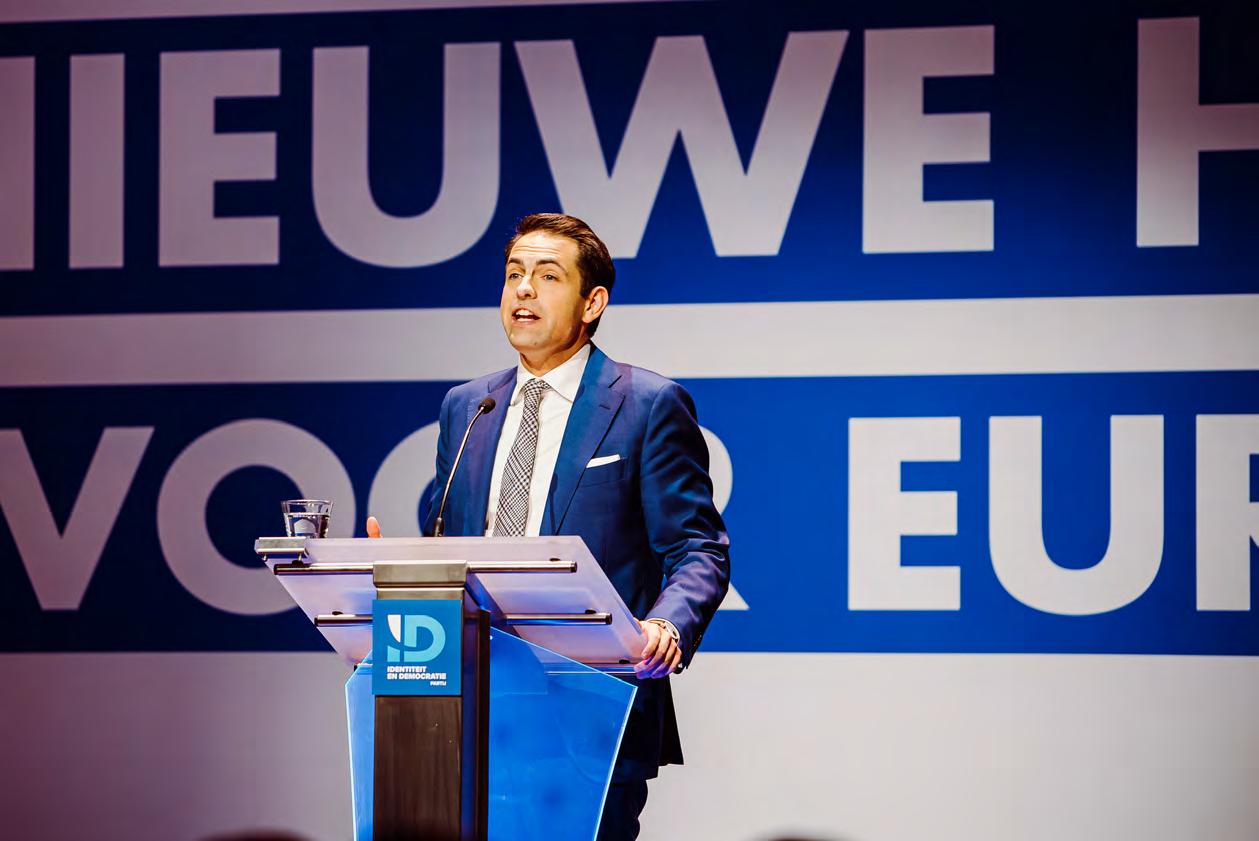
7 minute read
Le Vlaams Belang, prêt pour les responsabilités
Vlaams Belang, ready for responsibility
According to the polls, Vlaams Belang has become the largest party in Belgium. It is nevertheless based in the north of the country, with the primary ambition of being the major player in the declaration of independence of Flanders.
Advertisement
e ambition is to participate in the next Flemish government, which it has not been able to do so far due to a cordon sanitaire policy which keeps it in opposition. ey are now in a position to impose their presence at the negotiating table.
e party was founded in 1978 as the Vlaams Blok, a merger of two parties which had split from the Volksunie. It was in 1991 that it emerged electorally and took centre stage: appalled by the irruption of such a popular party, the other political formations spoke of “Black Sunday.” at was thirty years ago. Since then, it has grown steadily, with a gap between 2005 and 2015, when another Flemish patriot party (the Nieuw-Vlaamse Alliantie) rose in the ranks. However, the latter has not kept its promises and is ready to Le Vlaams Belang est devenu, selon les sondages, le premier parti de Belgique. Mais c’est bien au nord du pays qu’il est implanté, avec pour ambition première d’être l’acteur majeur d’une Flandre libre, souveraine et indépendante.
L’ambition est de participer au prochain gouvernement amand, ce qu’il n’a pas réussi à faire jusqu’à présent en raison d’une politique de cordon sanitaire qui le maintient dans l’opposition. Il est aujourd’hui en mesure d’imposer sa présence à la table des négociations.
Le parti est né en 1978 sous le nom de Vlaams Blok, fusion de deux partis issus de la Volksunie. C’est en 1991 qu’il émerge électoralement et occupe le devant de la scène : e arées par l’irruption d’un tel parti populaire, les autres formations politiques ont parlé de « dimanche noir ». C’était il y a trente ans. Depuis, il n’a cessé de progresser, connaissant un passage à vide entre 2005 et 2015, lorsqu’un autre parti patriote amand (la Nieuw-Vlaamse Alliantie)
join forces with the Walloon Socialist Party.
Under the presidency of the young president Tom Van Grieken, the party is again proudly waving its banner of yellow and black. It’s roaring like a lion once more! Vlaams Belang created a surprise in the 2019 federal elections. Since then, the polls have given it a boost by putting it in the lead of the voting intentions.
e aim is to build on this popular wave by entering government in a coalition which may involve other right-wing parties. In any case, Vlaams Belang is preparing itself for this. “In 2024, we must be able to exercise power. In the meantime, we need to restructure internally in order to develop this capacity,” said Tom Van Grieken.
e objective will then be to reopen the debate and move towards the independence of Flanders, the ultimate ambition of the party, nourished by years of struggle of the “Flemish movement” since the 20th century, since the French-speaking bourgeoisie despised the Flemish people. a connu une ascension. Mais ce dernier n’a pas tenu ses promesses et est prêt à s’associer avec le Parti socialiste wallon.
Sous la présidence de Tom Van Grieken, jeune président, le parti a retrouvé des couleurs. Et les siennes sont jaunes et noires. Il rugit à nouveau, comme le lion. Lors des élections fédérales de 2019, le Vlaams Belang a créé la surprise. Depuis, les sondages le confortent en le plaçant en tête des intentions de vote.
L'objectif est de concrétiser cette vague populaire en sa faveur en montant au gouvernement, dans une coalition qui pourrait impliquer d'autres partis de droite. Le Vlaams Belang, en tout cas, s'y prépare. « En 2024, nous devrons être en mesure d’exercer le pouvoir. D’ici là, nous devons nous restructurer en interne a n de développer cette capacité-là », a déclaré Tom Van Grieken.
L'objectif sera alors de rouvrir le dossier communautaire et évoluer vers l’indépendance de la Flandre, ambition ultime du parti, nourrie par des années de combat du « mouvement amand », depuis le XXe siècle lorsque la bourgeoisie francophone méprisait le peuple amand.
Chega, le parti qui vient bousculer l’ordre établi

Chega, the party shaking up the established order
In the parliamentary elections of 30 January 2022, the Chega party obtained 12 MPs compared to only one previously. e newcomer to Portuguese politics has managed to in uence the political debate and disrupt the balance in just three years.
e Portuguese political scene was well-ordered up until then: on the left, the Partido Socialista and on the centre-right the Partido Social-Democrata. e two are used Lors des élections législatives du 30 janvier 2022, le parti Chega a obtenu 12 députés, alors qu'il en comptait un seul auparavant. Le nouveau venu de la politique portugaise a réussi à peser dans le débat politique et à modi er les équilibres en trois ans à peine.
La scène politique portugaise était bien ordonnée : à gauche, le Partido Socialista ; au centre-droit, le Partido Social-Democrata. Les deux ont l'habitude de se partager le pouvoir :
to sharing power: the former enjoys the position of Prime Minister and the latter President of the Republic.
Portugal was the only country in Europe without a patriotic political party until the creation of Chega! (which in Portuguese means “Enough! ”) in spring 2019.
Its president, André Ventura from Lisbon, has a law degree from the University of Lisbon and a doctorate in public law from University College Cork in Ireland, but he made his name by commenting on football matches - a sport which has become a religion. However, the sprightly columnist soon diversi ed into commenting on the various things which plague Portuguese society.
As a politician, he rst supported the Social Democratic Party, which he eventually left, nally fed up with its centrist line. He has always advocated a break with the past and change, particularly in the area of immigration.
For this reason, he created Chega! , which is fast becoming the sensation of Portuguese politics, obtaining an MP in the person of its president in the October 2019 elections. On the benches of the Assembleia da República, Portugal's unicameral assembly, he set a re under the government by denouncing immigration and its consequences, along with the health measures. e other political parties ganged up on au premier le poste de Premier ministre ; au second celui de Président de la République.
Exception en Europe, le Portugal ne comptait pas de parti politique patriote jusqu’à la création de Chega (qui, en Portugais, signi e « Ça su t ») au printemps 2019.
Son président, le Lisboète André Ventura, est diplômé en droit de l'Université de Lisbonne et docteur en droit public de l'University College Cork d'Irlande, mais s’est fait connaître en commentant les matches de football, sport érigé en religion. Pourtant, le sémillant chroniqueur s'est vite diversi é en commentant les faits divers qui minent la société portugaise.
Engagé en politique, il a tout d'abord soutenu le Parti Social-Démocrate qu’il nit par quitter, las de la ligne centriste imprimé par ce dernier. Lui a toujours prôné la rupture et le changement, en matière d’immigration notamment.
C'est pour cette raison qu'il a créé Chega, qui devient rapidement la sensation de la vie politique portugaise en obtenant un député, en la personne de son président, lors du scrutin d'octobre 2019. Sur les bancs de l'Assembleia da República, assemblée monocamérale portugaise, il t feu de tout bois en dénonçant l'immigration massive et les conséquences qu'elle entraîne ou les mesures sanitaires. Les autres partis
Chega, but this did not prevent the party from continuing to grow, gaining a regional foothold even in the Azores, where it won two seats in the elections for the autonomous region.
Following the crisis caused by the parliamentary rejection of the government's proposed budget, the Portuguese people had to go to the polls again on 30 January 2022. While the Socialists won the electoral contest, obtaining an absolute politiques se sont ligués contre Chega, ce qui n'empêcha pas le parti de continuer à progresser, s'implantant régionalement, jusque dans les Açores où il obtint deux élus lors des élections au sein de la région autonome.

À l'issue de la crise causée par le rejet parlementaire du budget proposé par le gouvernement, les Portugais ont dû à nouveau se rendre aux urnes le 30 janvier 2022. Si les socialistes sortent vainqueurs de la joute électorale,

majority, the other big winner was Chega: with 7.15% of the vote, it became the third political force in the country, ahead of the Liberals and the radical left, and now has twelve elected members in Parliament.
André Ventura was pleased that the voters “understood the party's message” and has already announced that he will lead a real opposition to the socialist government. obtenant une majorité absolue, l'autre grand vainqueur est Chega : avec 7,15 % des voix, il devient la troisième force politique du pays, devant les libéraux et la gauche radicale, et compte désormais douze élus au Parlement.

André Ventura s'est réjoui que les électeurs « aient compris le message du parti » et a déjà annoncé qu'il allait mener une vraie opposition au pouvoir socialiste.



